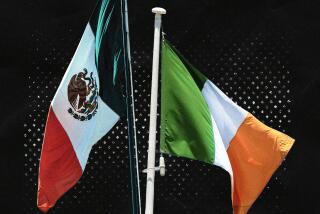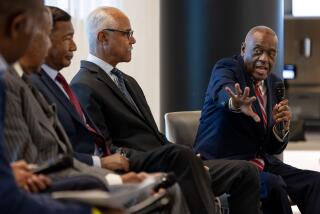Before Roosevelt, They Were the Real Heroes of Cuban War
- Share via
Re “The Charge for Teddy” (Jan. 16): While some are working to have the Medal of Honor awarded to Theodore Roosevelt for heroism on July 1, 1898, near San Juan Hill, others will honor the brave black and white soldiers who were the real heroes of the climactic Battle of Santiago, which ended the Cuban phase of the Spanish-American War.
Members of the last black 24th Infantry Regiment and my 77th Engineer Company are organizing an observance of the 100th anniversary of the Battle of Santiago, the charges up San Juan and Kettle hills, and the taking of El Caney, to take place at Arlington National Cemetery on July 1.
If all goes well, a highlight of the event will be the reading of a White House proclamation designating this date as a national observance of the battle.
Finally, 100 years later, it seems appropriate that Americans learn who were the real heroes of one of the United States’ most historic victories: thousands of brave regulars and reserves, among whom the most heroic were black 24th and 25th infantrymen and 9th and 10th cavalrymen.
DAVID K. CARLISLE
Los Angeles
*
To consider awarding Teddy Roosevelt the Medal of Honor posthumously without honoring the black 9th and 10th cavalries who opened the way for the Rough Riders in their assault on Las Guasimas on June 24, 1898 (and saved them from complete annihilation), and the black 25th Infantry who reinforced the Rough Riders at El Caney on June 30 is to perpetuate another myth of American history.
Teddy Roosevelt himself expressed the highest praise for the black troops, although he modified his praise later.
Maj. Gen. Nelson A. Miles, the ranking officer of the U.S. Army, also praised the gallantry of the black troops for their military abilities and for volunteering “to succor the sick, nurse the dying and bury the dead in the hospitals and Cuban camps.” He was probably referring to the nearly 100 men of the black 24th Infantry who volunteered as nurses when a yellow fever epidemic broke out.
Too much of our history has been obscured or denied to let these men and these events go unnoticed and unhonored any longer.
JOANNE WEINHOFF
O’BYRNE
Long Beach
*
The Medal of Honor may have been denied Teddy Roosevelt for good reason, contrary to the tenor of the article in the Los Angeles Times.
Teddy Roosevelt, with Ivy Leaguers, Indian fighters and cowboys comprising the Rough Riders, could claim victory only because the Spanish in Cuba were even more inept than Gen. William R. Shafter, overall commander, and his staff.
Newspaper reporters at the time, including Richard Harding Davis, Stephen Crane and the New York Herald’s Sylvester Scovil, wrote disparagingly about this “adventure.”
DEAN W. TERLINDEN
Long Beach
*
If justice wasn’t done in 1898, it isn’t being done in 1998 as the Medal of Honor is being considered for Theodore Roosevelt, who led his dismounted cavalry volunteers up Kettle and San Juan hills. Roosevelt and his Rough Riders arrived on those hilltops after the fact.
Those high battlegrounds were taken by men of the regular U.S. Army: They were from the 9th and 10th Cavalry, dismounted, along with the 24th and 25th Infantry. The regulars were securing Spanish prisoners and tending the wounded when Roosevelt and his volunteers arrived.
Those four regular Army regiments that took their hilltop objectives were formed just after the Civil War and had been on frontier duty during the Indian wars. They were combat-wise, battle-hardened, sea-soiled regulars. Roosevelt’s volunteers did not have the in-the-field experience of those professionals the Indians called “Buffalo Soldiers.”
Don’t give an honored decoration when it wasn’t earned.
JAMES H. MOORE
Bakersfield
More to Read
Sign up for The Wild
We’ll help you find the best places to hike, bike and run, as well as the perfect silent spots for meditation and yoga.
You may occasionally receive promotional content from the Los Angeles Times.






